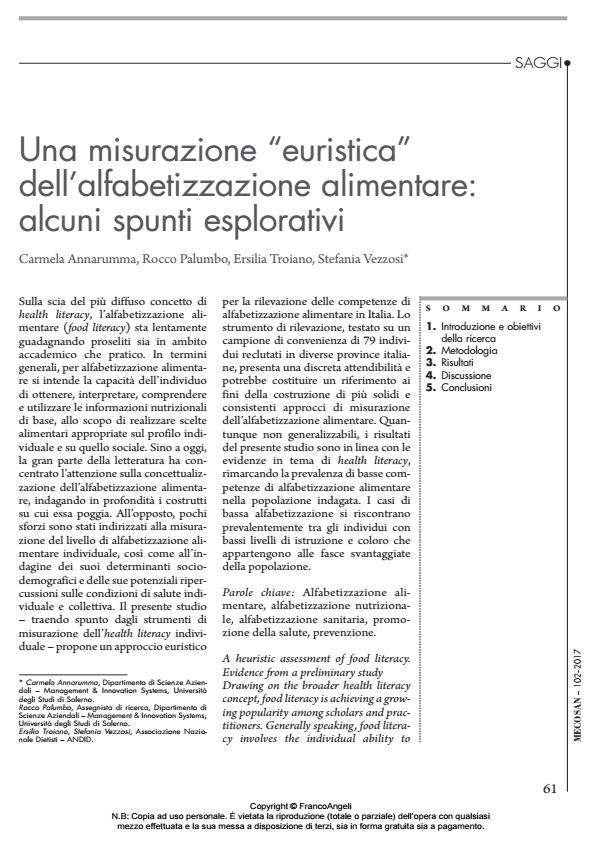Una misurazione "euristica" dell’alfabetizzazione alimentare: alcuni spunti esplorativi
Journal title MECOSAN
Author/s Carmela Annarumma, Rocco Palumbo, Ersilia Troiano, Stefania Vezzosi
Publishing Year 2018 Issue 2017/102
Language Italian Pages 23 P. 61-83 File size 23750 KB
DOI 10.3280/MESA2017-102004
DOI is like a bar code for intellectual property: to have more infomation
click here
Below, you can see the article first page
If you want to buy this article in PDF format, you can do it, following the instructions to buy download credits

FrancoAngeli is member of Publishers International Linking Association, Inc (PILA), a not-for-profit association which run the CrossRef service enabling links to and from online scholarly content.
A heuristic assessment of food literacy. Evidence from a preliminary study Drawing on the broader health literacy concept, food literacy is achieving a growing popularity among scholars and practitioners. Generally speaking, food literacy involves the individual ability to Quest’ultiobtain, interpret, understand, and use nutrition and food-related information, paving the way for appropriate nutrition choices at both the individual and the collective levels. To the authors’ knowledge, the scientific literature has focused most of its attention on the conceptual building blocks of food literacy, in an attempt to provide a full-fledged understanding of this construct. On the other hand, limited attention has been paid to the measurement of individual food literacy skills, as well as to the examination of its socio-demographic determinants and its health-related consequences. In light of the recent developments in the field of health literacy, this paper suggests a heuristic approach to assess individual food literacy skills in Italy. The proposed measurement tool - which was tested on a convenience sample of 79 people recruited from different areas of Italy - showed a good internal reliability. From this point of view, it could represent a benchmark to arrange more consistent approaches aimed to assess individual food literacy skills. Although the research findings are not generalizable, they mirror the insights which could be collected from studies in the field of food literacy. Indeed, inadequate and problematic food literacy were prevailing. Limited food literacy skills were especially common among those with low education levels and disadvantaged people.
Keywords: Food literacy, nutrition literacy, health literacy, health promotion, prevention.
Carmela Annarumma, Rocco Palumbo, Ersilia Troiano, Stefania Vezzosi, Una misurazione "euristica" dell’alfabetizzazione alimentare: alcuni spunti esplorativi in "MECOSAN" 102/2017, pp 61-83, DOI: 10.3280/MESA2017-102004